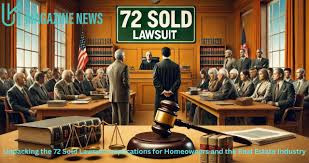Introduction
The real estate landscape has undergone significant changes in recent years, with innovative models like 72 Sold gaining popularity for their unique approach to home selling. The company offers an intriguing proposition: selling homes within a tight timeframe of 72 hours. However, this rapid growth has not come without challenges. The 72 Sold lawsuit has emerged as a critical issue, raising questions about the practices and claims made by the company. This article delves into the details of the lawsuit, the allegations against 72 Sold, and its potential impact on the real estate market.
Understanding the intricacies of the 72 Sold lawsuit is vital for home sellers, buyers, and real estate professionals. As the industry evolves, the implications of this legal battle could influence how future transactions are conducted and how companies market their services. From claims of misleading advertising to the ethical considerations surrounding their business model, the lawsuit is emblematic of the broader issues facing the real estate sector today.
This article will explore the background of 72 Sold, the nature of the allegations, the company’s defense, and the ongoing legal proceedings. By examining these elements, readers will gain a comprehensive understanding of the situation and its ramifications.
Background of 72 Sold
What is 72 Sold?
Founded by industry veterans, 72 Sold has revolutionized the way homes are sold, presenting an enticing alternative to traditional real estate practices. Their model is built around the promise of selling a home in just 72 hours, attracting sellers looking for quick transactions. Unlike conventional methods, which can take weeks or even months, 72 Sold leverages a streamlined process that aims to eliminate the stress and uncertainty often associated with selling property.
The company markets itself as a solution for homeowners who want efficiency and speed without sacrificing value. By utilizing advanced marketing strategies and a network of real estate agents, 72 Sold has positioned itself as a disruptive force in the real estate industry. This innovative approach has garnered a significant following, leading to rapid growth and expansion across various markets.
The Success of 72 Sold
The success of 72 Sold can be attributed to its ability to meet the demands of modern sellers. In an age where time is of the essence, the company’s unique selling proposition resonates with homeowners eager to move on to their next chapter. Their promotional strategies, which include compelling advertisements and testimonials from satisfied clients, have bolstered their reputation and helped them capture a substantial market share.
However, with success often comes scrutiny. As 72 Sold gained prominence, questions began to arise regarding the validity of their claims. Competitors and dissatisfied customers voiced concerns, prompting legal actions that would eventually culminate in the current lawsuit. Understanding this context is essential for grasping the full implications of the legal battle that now surrounds the company.
The Legal Allegations
Key Claims in the Lawsuit
The 72 Sold lawsuit centers on several allegations made against the company, which are serious and warrant attention. Plaintiffs in the case include former clients and industry competitors who assert that 72 Sold engaged in practices that misled consumers. The key claims revolve around accusations of false advertising, where the company is said to have exaggerated the speed and efficiency of its home-selling process.
Specific allegations include misleading representations about the costs associated with using 72 Sold’s services and the effectiveness of their marketing strategies. Critics argue that the company’s promotional materials painted an overly rosy picture of the selling experience, leading clients to believe they would receive far better outcomes than what was delivered. Such claims not only challenge the credibility of 72 Sold but also raise ethical concerns about transparency in the real estate market.
Impact on Home Sellers
The ramifications of the allegations extend beyond legal proceedings; they also affect home sellers who may have relied on 72 Sold’s promises. Many clients who engaged with the company are now questioning whether they made the right choice in trusting the model. The concerns raised in the lawsuit have led to a wave of skepticism among potential sellers, who may hesitate to engage with 72 Sold out of fear of inadequate service.
Moreover, the lawsuit highlights the importance of due diligence when selecting a real estate partner. Homeowners are now more aware of the potential pitfalls associated with quick-selling models and may approach such offers with greater caution. As the legal proceedings unfold, it remains to be seen how the outcome will influence the company’s reputation and the decisions of future sellers.
Defense and Response from 72 Sold
72 Sold’s Official Response
In light of the lawsuit, 72 Sold has been proactive in defending its business practices. The company released a formal statement addressing the allegations, asserting that they are baseless and lack merit. 72 Sold emphasizes its commitment to providing transparent and efficient services to homeowners, arguing that the lawsuit stems from a misunderstanding of their business model.
Legal representatives for 72 Sold have outlined their defense strategy, which focuses on disproving the claims made against them. By presenting evidence that supports their business practices, the company aims to clear its name and reinforce its position in the market. Additionally, 72 Sold has expressed confidence in its ability to resolve the legal matter favorably, indicating that they are prepared for a prolonged battle if necessary.
Supporting Evidence and Company’s Claims
To bolster its defense, 72 Sold has gathered testimonials and endorsements from satisfied clients who have successfully sold their homes through the program. These positive experiences serve as a counter-narrative to the allegations, showcasing the effectiveness of the company’s model. Furthermore, 72 Sold highlights its innovative marketing techniques and the expertise of its real estate agents as proof of its commitment to excellence.
The company’s public relations efforts have also played a crucial role in managing the fallout from the lawsuit. By actively engaging with media outlets and maintaining an open line of communication with the public, 72 Sold aims to mitigate any damage to its reputation. This multifaceted approach to defense demonstrates the company’s determination to overcome the challenges posed by the legal proceedings.
Legal Proceedings and Outcomes (Ongoing/Concluded)
Timeline of Events
The timeline of the 72 Sold lawsuit has been marked by significant developments since the allegations were first made. The case began when plaintiffs filed a formal complaint, prompting a series of legal actions and responses from the company. Key milestones include hearings, depositions, and the submission of evidence by both parties.
As the lawsuit unfolds, both sides continue to navigate the complexities of the legal system. The timeline illustrates the procedural nature of the case, as well as the lengths to which 72 Sold is willing to go to defend its practices. Legal experts following the case have noted that the outcome could hinge on the strength of the evidence presented by both parties, making it a pivotal moment for the company.
Possible Consequences for 72 Sold
The potential consequences of the lawsuit for 72 Sold are significant and could reshape its operations in various ways. If the court finds in favor of the plaintiffs, the company could face substantial penalties, including fines and mandatory changes to its business practices. Such outcomes would not only affect the company financially but could also impact its market position and credibility.
Conversely, a favorable outcome for 72 Sold could reinforce its business model and restore confidence among potential clients. Regardless of the verdict, the lawsuit serves as a cautionary tale for companies in the real estate sector, highlighting the importance of ethical marketing practices and the potential repercussions of misleading claims.
Impact on the Real Estate Market
The implications of the 72 Sold lawsuit extend beyond the company itself, resonating throughout the real estate market. As the case draws attention, it raises important questions about consumer protection and the integrity of real estate transactions. Industry experts are closely monitoring the situation, recognizing that the outcome could influence regulatory changes and lead to increased scrutiny of real estate practices.
Moreover, the lawsuit serves as a reminder for other companies to ensure transparency and accountability in their marketing efforts. As consumers become more informed and skeptical, real estate businesses must adapt to meet evolving expectations and maintain trust in their services. The 72 Sold case could ultimately catalyze positive changes in the industry, encouraging a shift towards more ethical practices.
Conclusion
The 72 Sold lawsuit represents a significant chapter in the ongoing evolution of the real estate industry. As companies innovate and adapt to changing consumer demands, legal challenges like this one underscore the need for transparency and accountability. Home sellers, buyers, and industry professionals must remain vigilant, learning from the lessons presented by this case.
While the future of 72 Sold hangs in the balance, the implications of this legal battle will likely resonate for years to come. Whether the company emerges unscathed or faces significant consequences, the outcome will shape public perceptions and influence the practices of other real estate businesses. As the industry continues to evolve, one thing is clear: the importance of ethical practices in real estate cannot be overstated



